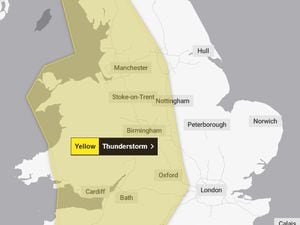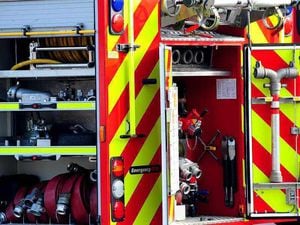GPs regret missing vital clues before the death of former Shropshire teacher
Two under-pressure family doctors told an inquest that they regret not doing more to investigate the health problems of a respected former Shropshire teacher.

Retired deputy headteacher Percy Mullaly, aged 77, died on August 22 last year due to a blood clot, just days after telephone consultations with two different GPs at Shrewsbury’s Claremont Bank surgery.
Both GPs, Dr Mary Eardley, who has since moved from Claremont Bank, and Dr Matthew Fallon, both appeared at Monday’s inquest with barristers to represent them.
Assistant Shropshire and Telford & Wrekin coroner, Heath Westerman, played audio recordings of Mr Mullaly, a former deputy head of Crowmoor School, Shrewsbury, as he discussed his condition.
In one of the calls, on August 20, Mr Mullaly told Dr Fallon, the surgery’s duty doctor, that he could not walk 10 yards without getting out of breath and was having problems with his knees.
But he admitted that he did not further investigate what Mr Mullaly was telling him, which turned out to be “red flags” for a blood clot in the lungs. Mr Mullaly had been given treatment for deep vein thrombosis in the past, the inquest was told.
Dr Fallon told the inquest that he thought “I was stuck in a rut with a prescriptive diagnosis”. He said he believed that an X-ray would more than likely reveal Mr Mullaly had cancer.
Dr Fallon told the inquest that he regretted that he did not call for a more urgent response, which could have included going to accident and emergency, or calling him in for a face-to-face appointment.
A tearful Dr Eardley told the inquest that she had mainly a professional relationship with Mr Mullaly. But he “used to referee in my children’s football games” and they used to exchange pleasantries. He had been diagnosed with deep vein thrombosis (DVT) in November 2019 and had been prescribed blood thinning anti-coagulant.
But the treatment had been stopped in May 2020 after he had a telephone consultation with a locum doctor at the surgery. Dr Eardley told the inquest that the doctor had been qualified to make the decision but that she did not know at the time that recommendations had changed on keeping patients on such drugs indefinitely.
On August 11, Dr Eardley saw Mr Mullaly in a face to face consultation where he spoke of a pain in his right chest and an ache in both of his knees.
She told the inquest that her main concern was with the prospect of diabetes.
“No red flags fr pulmonary embolism appeared to me as a part of the consultation,” she said. And Dr Eardley said he did not appear acutely unwell.
Crucially, a chest X-ray at Royal Shrewsbury Hospital had been cancelled because of the coronavirus pandemic.
Dr Eardley also spoke to her patient over the telephone on August 20 but said getting a chest X-ray was uppermost in her mind.
But she admitted that other options “weren’t adequately pursued.”
“I was on call at a very pressured time and going to see two patients with Covid symptoms,” she said.
Mr Mullaly had mentioned that he had a cough, and she advised him to get a test before the X-ray.
“I had not meant to delay his chest X-ray and I am very regretful that I gave the wrong impression to Mr Mullaly.” She also said that it “did not cross my mind” to seek an urgent referral to accident and emergency or bring him in for an immediate face to face consultation.
“In hindsight I realise that was the wrong decision,” she said. “I hadn’t realised how much he had deteriorated.”
As a result of the episode Dr Eardley said: “My confidence has been shattered, and I have been very upset by things that have been said about me.”
“I decided to remove myself from that situation and to put in place things to stop it happening again and I have done a lot of learning.”
She said she is not doing any on-call work and now has “more time to think about each patient.” She has also worked to educate others on issues of thrombosis.
Coroner Heath Westerman said he had been “deeply moved by what you have said and how it has affected you personally.”
Concerned about the standard of care that his father had received, Darren Mullaly had called for the inquest to take place. When the inquest opened last year the death was going to be put down as being “natural causes”.
Mr Mullaly, who was not legally represented, asked a series of questions to doctors and medical professionals during the day-long inquest, including requesting General Medical Council reports into the two doctors. But Mr Westerman decided that they would have been outside the limited scope of inquests. “They are the subject of a separate investigation with other outcomes,” he said.
Mr Mullaly said his father had been implored to go to accident and emergency but he had trusted the medical professionals.
“He thought he would be a burden, he had trust in doctors,” he said.
But on August 22, the inquest heard that he died from a very large clot that had probably worked its way up from his legs to his lungs.
A post mortem was carried out by Dr Ellen Cobby at Royal Shrewsbury Hospital and reviewed by retired consultant pathologist Dr Richard Sheherd. They agreed that a pulmonary embolism was the main cause of death but disagreed whether to add other medical conditions as a main cause or contributory causes.
The inquest also heard from expert witness Professor Abdallah Al-Mohammad, a top cardiologist.
When asked whether he thought Mr Mullaly’s death was preventable on August 19 or 20 he said without a measurement on his blood pressure it was “impossible to give a definitive answer.”
But he said from listening to recordings of phone callsthe professor said: “The patient was giving definitive evidence. He was giving an assessment of eight on a plate, this is an objective finding.”
But under questioning he added: “An acute pulmonary embolism can be missed, it is not an easy diagnosis in general practice or in an acute hospital setting. Sometimes it is difficult.”
The coroner adjourned coming to his conclusions to allow himself to think about what he heard.
Mr Westerman said he would email his conclusions within a week.





